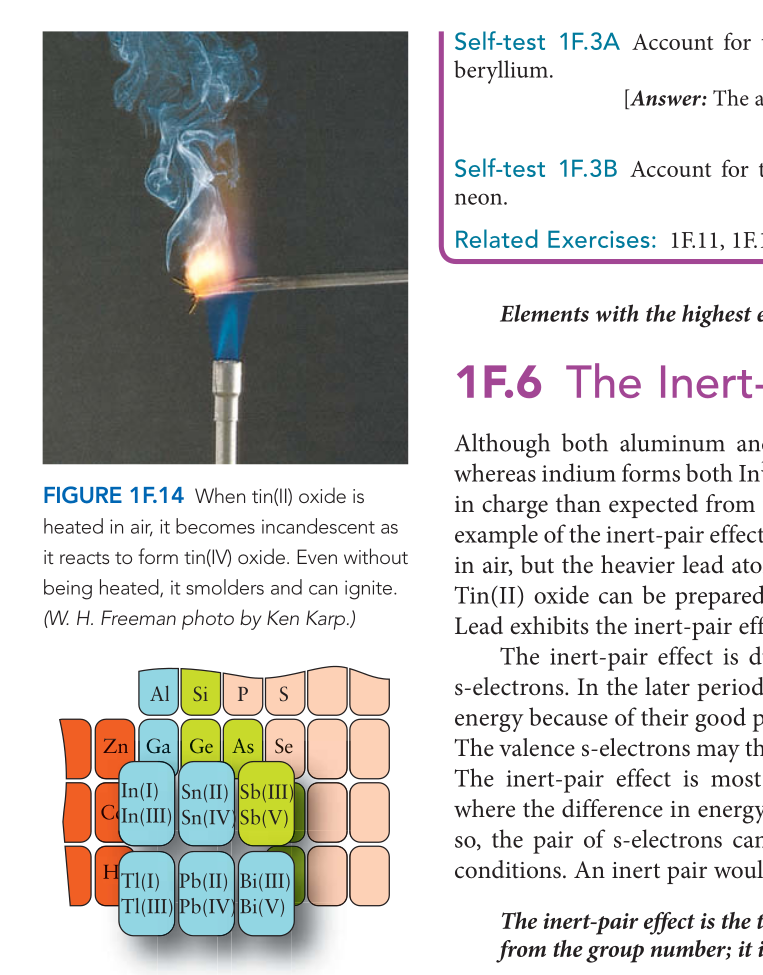Reading Chemical Principles by Atkin
August 9, 2024
Introduction
As a high school freshman at that time, immediate classroom teachings of chemistry was inaccessible to me. Surely, this won’t stop my attempts to study on my own and fulfill my greedy, greedy curiosity.
I cannot find that particular Reddit post anymore; most posts nowadays seem to recommend the Zumdahl textbook.
I found Atkin’s Chemical Principles: The Quest for Insight in a Reddit post, like I always do when searching for self-study materials. Many sources indicate to me that it is not the best option for self-study, but it is nonetheless a great option. Being full of illustrations, having thorough explanations, and cataloging a large selection of problems: they are all indicators that the book can work great for self-study.

Lots of pictures!
Setting expectations, I approached the book like a math book - that is, I do every problem that there is a solution to at the back of the book. This proved to be my central part of learning.
The Reaction Mechanism
From 2023-12-25, I set off to complete one section every day. In this pace, omitting and skipping some sections that are redundant or superfluous to me, I finished working on the entire book by 2024-03-04. I would read the entire section, take short notes, and work through the problems - a fairly standard procedure for self-study.
Notably, I did not utilize any external sources, and I settled with only using the book.
Thermodynamics pp.378-483, electrochemistry pp.682-721
For me, thermodynamics (Ch. 4) and electrochemistry (second half of Ch. 6) were conceptually difficult. This seems to be true for many students. Thermodynamics involves dealing with concepts that are inherently alien and unfamiliar, while electrochemistry invites “wrong way around” mistakes - similar to the notorious “off-by-one” mistakes in computer science.

The problems I encountered were like this.
Calculations of pH related topics, especially involving polyprotic acids and bases (first half of Ch. 6), were mathematically difficult for me when complicated settings are involved.
pH calculations pp.582-657
With these difficulties, my strategy was simple - I would just work through the problems. Sometimes something will click, and I would suddenly get it. Sometimes the problems would left me confused. I accepted this reality, but I did not do anything to change it.
Generally, the book seems to encourage a holistic and intuitive understanding of chemistry. While intuitive understandings may have its pitfalls, it is certainly essential on a high school, or even undergraduate level. As I worked through the book, I could recognize such thinking patterns seeping through my mind. I might have not grasped it completely, but I did certainly understand what it means to think like a chemist.
Regrettably, I seemed to only have retained the thinking patterns, rather than any sophisticated technical knowledge.
Periodic reflections
What could I have done better?
First, completing one section every day is a terrible, terrible schedule. I find that setting time goals (e.g., an hour every day) works much better for me than setting content goals (a section every day), not mentioning how uneven content assortment can be across sections. Changing the schedule in this way would also encourage me to put more time into challenging topics that I mentioned previously.
I would also use space repetition software to make flashcards that promoted active recall to prevent the contents slowly but surely fading in my mind as I progressed through the book.
With the new approach on scheduling, I would incorporate external resources like videos and lectures to accompany difficult sections, ensuring that each section is understood before moving on to the problems. I would also spend more time on harder problems to work it out myself instead of giving up after a short time.
Through this book I also saw the importance and utility of knowing calculus - the problems are calculus-optional, but quite often the most interesting and practical problems require some degree of calculus knowledge.

Problems that require calculus are marked with the iconic long S.
The self-study journey also demonstrated to me how incredibly viable self-study via reading and working through a book really is. If I can get used to and get good at learning this way, there are certainly a lot of things that are waiting to be uncovered. Physical chemistry, organic chemistry, advanced math topics…
The Yield
After working through the book, I passed a placement exam for me to be placed at the AP chemistry level, creating an early opportunity for me to better explore the topics in the book in a classroom setting.
More importantly, the experience taught me how to learn from a book. As corroborated by Reddit netizens and YouTube channel “The Math Sorcerer”, this might be the most straightforward method in a number of efficient study methods. With a little determination, an hour every day, and a study plan, it is surprising what you can achieve.
As for the future, I plan to go back to more advanced topics in chemistry after I complete calculus.
In retrospect, Kai fell in love with math and is now exploring undergraduate level math instead of more chemistry.
mi tawa.